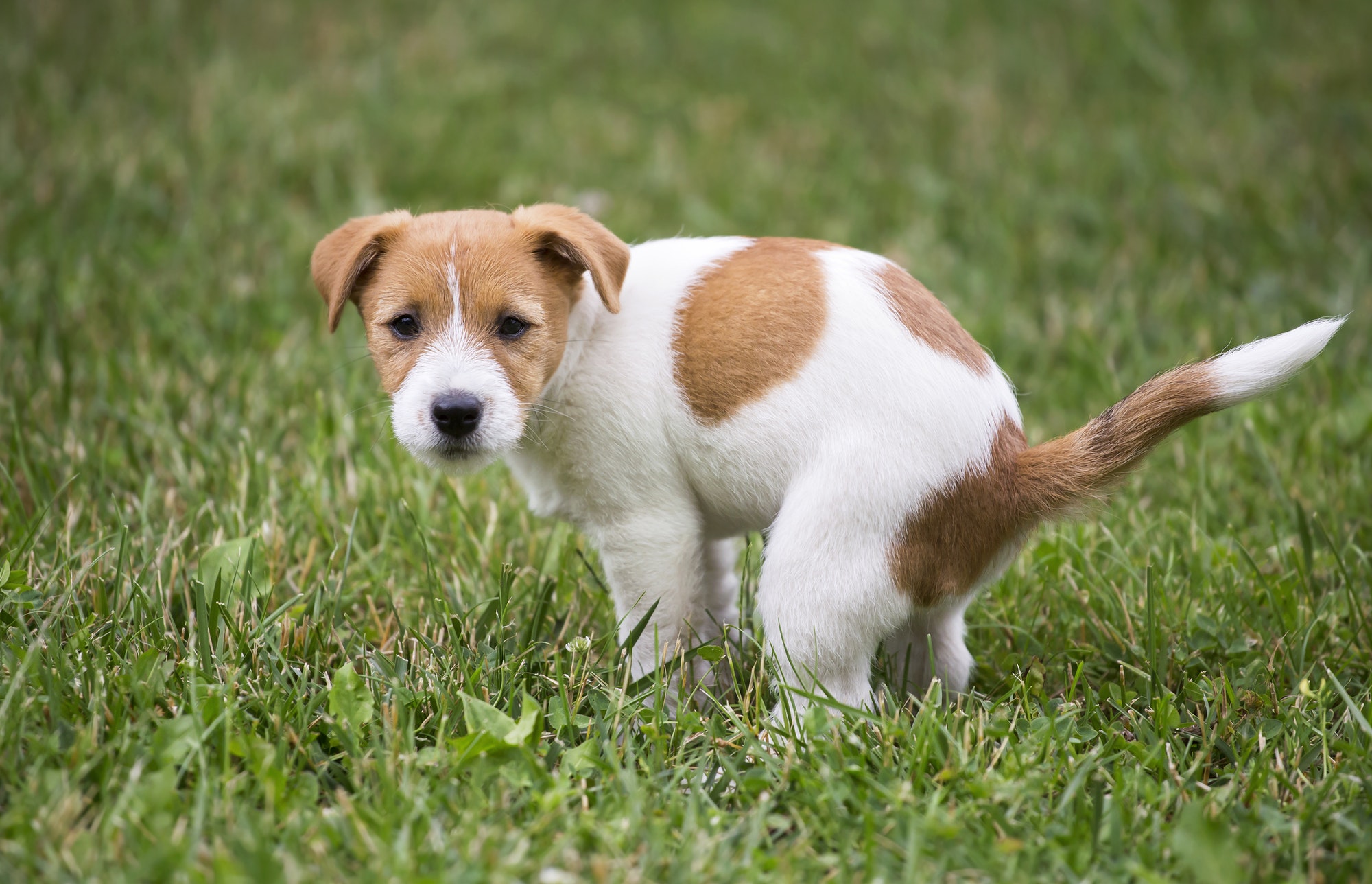My dog is constipated
Constipation in dogs can be a cause for concern, especially because it can lead to the fear of a serious underlying condition: intestinal obstruction.
However, constipation can be caused by many other conditions in our four-legged friends, each with varying degrees of severity. In order to best react when your dog seems constipated, here is everything you need to know about this health problem, its causes, its consequences and possible treatments.
What is constipation in dogs?
Constipation is a digestive disorder that results in less frequent bowel movements, which are then often hard and sometimes relatively dry. Constipation is not a disease in itself, but a symptom of an underlying disorder that may be benign or more serious.
In the constipated dog, there may be signs of pain, especially when defecating, some distress and visible difficulty in eliminating. Depending on the pathology involved in your dog's digestive disorder, the general condition of the animal may be altered and other symptoms may appear.
Symptoms of constipation in dogs
Constipation in dogs is not always obvious, especially when it is mild. A healthy dog usually defecates two to three times a day, between 4 and 15 hours after eating. A dog that defecates only once a day, or less, can be considered constipated, although some animals may also have a slow digestive transit, without being in poor health.
In addition to the rate of bowel movements, there are other symptoms that indicate constipation. A constipated dog will tend to try to relieve itself without success, sometimes with complaints of pain. The appearance of the stool can also tell owners a lot about their dog's health: hard, compact, "dry" feces are typical of constipation. A constipated dog may also pass a small amount of mucusy, sometimes bloody, stool.
In addition to the symptoms that occur at the time of elimination, constipation may be manifested by non-specific signs that indicate the dog's distress. Unusual fatigue, sudden shyness, lack of energy or a prostrate attitude should alert you.
Finally, a constipated dog will tend to have a swollen, tender, hard abdomen. When this disorder is accompanied by severe pain, the dog may even limp, with each step causing intestinal pain.

Causes of constipation in dogs
There are many causes of constipation in dogs, and while it's important not to overlook this condition, it's important not to panic too much if your dog has not defecated for a day or two, especially in certain situations.
Dog constipation and dietary changes
A sudden change in diet almost always leads to digestive disorders - sometimes severe. For this reason, it is always recommended to make a long-term dietary transition, although this is not always possible. Most often, a sudden change of diet leads to diarrhea, but constipation can also occur. Diet is the most common cause of constipation in dogs. It should be noted that constipation is more common in animals that are switched from wet and/or raw foods (pate, BARF diet, home rations) to dry foods (kibble). Extruded kibbles are slower and more difficult to digest than wet food.
Dog constipation and sedentary lifestyle
It cannot be repeated often enough, a dog must exercise to stay healthy, whether it is a small Maltese or a Husky. There is no breed of dog that does not need physical activity, and a sedentary lifestyle always leads to health problems in our four-legged friends. A sedentary lifestyle is the number two cause of constipation in dogs, and exercise allows our companions to stimulate their digestion and evacuate their food properly. Whether your dog is a great athlete or a little slob, remember to always offer him daily walks, at a pace and duration adapted to his needs and physical condition.
Dog constipation and stress
The digestive system is particularly sensitive to stress, and diarrhea and constipation are two common responses of the dog's body to an anxious situation. As in humans, the dog's brain reacts to stress by preparing the body for an impending intense physical activity - flight or fight. As a result, the nervous system fires up some organs and mutes others that are less useful in a survival context. Among other stress-related phenomena, the nerve controlling the emptying of the dog's intestines pauses when the nerve controlling the rectum is activated. The stomach empties more slowly, the intestinal motricity is disturbed and the colon empties more quickly. If these phenomena are often the cause of diarrhea, constipation can also occur, each reaction to stress being unique. A move, a trip, a veterinary visit, a storm or fireworks can therefore be the cause of your dog's ailments.
Dog Constipation and Behavior
Some dogs - especially those under stress - may be too shy to defecate. This may sound strange, but it is a fact. Some dogs are too upset by their environment to take the time to do the big job (which makes them vulnerable to attack) once they're outside. Others simply don't find their environment to their liking and prefer to hold back until the right moment, sometimes without finding the right moment to relieve themselves. Those dogs that hold back voluntarily at first may later develop real physiological constipation, as their feces tend to accumulate and dry up in their colon, until it is no longer possible to evacuate them, even when the animal finally decides to do so.
Constipation and diarrhea in dogs
It is sometimes forgotten, but a dog suffering from diarrhea will tend to empty his bowels completely, in which case he has nothing left to evacuate in the days following his illness. So if your dog has had recent diarrhea, it's possible that he simply has an empty bowel, in which case it may take two or three days for his bowel movements to return to a normal rate of elimination. On the other hand, if your dog has been sick recently, it is possible that the medication prescribed by your veterinarian has affected his transit. A quick call to the vet will certainly give you a reliable answer to this question.
Dog constipation and intestinal obstruction
Here we go, to that intestinal obstruction that many owners dread! When a dog stops defecating, many worried owners may assume that he must be "blocked" somewhere, which is a life-threatening veterinary emergency. However, there is no need to assume the worst in cases of constipation, especially when the animal is doing well apart from its transit problems. In the case of intestinal obstruction, the dog's abdomen is swollen and hard, vomiting may occur and the dog is in visible pain. If you notice such symptoms, it is indeed essential to take your dog to a veterinarian quickly. Note that intestinal obstructions are more common in gluttons who swallow anything (toys, tissues, pieces of wood, etc.), as well as in those who eat bones.
Dog constipation and diseases
Various diseases and metabolic disorders can also cause constipation in dogs. Hormonal disorders, such as hypothyroidism, can be the cause of organism disturbances, with almost inevitable repercussions on the transit of our four-legged companions. Hypercalcemia, an abnormal increase in the level of calcium in the blood, or hypokalemia, a deficiency in potassium, can also be suspected. Conditions specific to the digestive system, such as a permanently dilated colon, a perineal hernia, or intestinal hypomotility, can also cause constipation of varying severity in dogs. Finally, a pain or a mass may also impact the transit, either by blocking the path of excrement towards the rectum, or by discouraging the dog from defecating, as it fears suffering at the time of eliminating its stools.

Treatment of constipation in dogs
When left untreated, constipation can cause serious damage to the dog's digestive system. The animal's feces will inevitably become hard and dry, permanently blocking the passage of future feces and damaging the intestinal lining.
To determine which treatment is appropriate for constipation, it is essential to first identify the cause of the problem. Indeed, if a local treatment (suppository, laxative, kerosene, etc.) can help your dog to defecate temporarily, thus treating the symptom of constipation, the problem is likely to come back as long as its cause is not treated.
A visit to the veterinarian is therefore essential to establish a diagnosis in case of constipation lasting more than forty-eight hours or when the dog presents additional symptoms (fever, tremors, slimy diarrhea, depression, swollen abdomen, etc.).
FAQ
How do I know if my dog is constipated?
A healthy dog usually defecates two to three times a day. If your dog has not pooped for an entire day, he is probably constipated. When a dog is unable to eliminate, you may also notice unsuccessful attempts to defecate, which may alert you to the fact that your dog is pretending to defecate but not succeeding, sometimes showing signs of pain.
My dog is constipated, what should I do?
If your dog is constipated, but has no other symptoms (droopiness, fever, swollen abdomen, vomiting, etc.), you may want to wait 48 hours before taking him to the veterinarian. Use this time to investigate the cause of your dog's constipation to avoid a recurrence of the condition, which could lead to long-term damage to his digestive system. On the other hand, if your dog seems down or tired, has a swollen abdomen, is vomiting or passing watery, bloody stools, he should be taken to the vet as a matter of urgency.
Can I give kerosene oil to my dog when he is constipated?
In some cases, kerosene oil can help a constipated dog defecate. However, this recipe only treats the symptom, not the cause, so the constipation may return. In fact, it is highly preferable to take your dog to a veterinarian who will diagnose the cause of his ailment and prescribe an effective and adapted treatment.
What causes constipation in my dog?
Constipation in dogs can be caused by a number of things, the most common of which are inadequate nutrition and a sedentary lifestyle. If your dog has any kind of digestive system problem, you need to take a close look at his diet to make sure it's just right for his body and profile.
You should also make sure that your dog gets enough physical activity every day, even if you've heard that he's not a very athletic breed: all dogs need exercise to stay in shape. Constipation in dogs is one of those conditions that are often caused by an inadequate or low-quality diet and a sedentary lifestyle.
These two phenomena are, moreover, at the origin of many other disorders in dogs, both physical and behavioral. To prevent your dog from suffering from minor or more severe ailments, start by making sure that the lifestyle and diet you impose on him are suitable: this simple questioning should save you many unnecessary veterinary visits!


